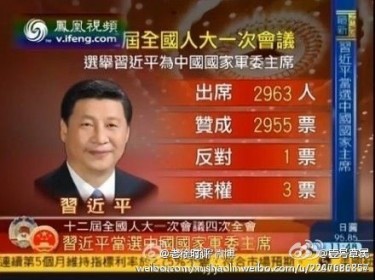China's social media censors are cracking down on discussion about the mysterious identity behind the lone vote cast against communist leader Xi Jinping‘s formal appointment as president.
In a largely ceremonial vote, Xi was selected as expected as China's president with 2,955 votes in favor and three abstentions on March 14, 2013 during the 12th National People's Congress.
But one vote of dissent was counted among the tally, and the identity of the deputy who cast the vote was not released.
Many immediately took to popular Chinese microblogging site Sina Weibo to wonder who the lone opposing voice could be, but Weibo censors soon scrubbed the site of many of the comments involving the “vote of dissent” and added the term to its long list of banned words.

The results of the vote were circulated on Weibo with netizens wondering who cast the vote of dissent.
State media praised Xi as the president with the most votes since Mao Zedong‘s time. On Weibo, ifeng news [zh] circulated on Weibo a diagram of voting results from past presidents to compare: Jiang Zeming had 35 votes of dissent while outgoing President Hu Jintao had three.
One Weibo user “Zeng Langbo” commented [zh] sarcastically:
中国好像更“民主”了!
Looks like China is becoming more democratic.
News analyst “Laoxu Shiping” wrote [zh]:
当选不是新闻,高票当选也不是新闻,而这三票弃权特别是这一票反对票是谁投的,这才是新闻。
Xi's election is not news, the large number of winning votes is not news, but the one vote of dissent and who cast this vote is news.
Famous scholar and writer Wu Jiaxiang continued the point [zh]:
一票反对也不是新闻,新闻是能出这样的新闻。
The vote of dissent is not news, but being able to publish it is.
Some Web users speculated that the vote of dissent came from Xi himself. Sheng Dalin, news analyst from Henan-based newspaper Dongfang Jinbao wrote [zh]:
不会是习大大自己吧?据说八大选主席的时候出现了一张反对票,惊动了特殊部门,一查,原来是毛自己投的!
Maybe it's Xi himself? We heard that during the 8th National People's Congress, there was only one vote of dissent, which shocked some special departments, then they found out that Mao himself cast the vote!
Some other users also speculated that the vote of dissent was arranged deliberately to give the illusion of debate. “yjhjerry” wrote [zh]:
我倒有点怀疑是不是故意为之了。帝国主义不是说我们操纵选举走过场么,那么干脆坐实,不妨弄一两张反对弃权票什么的,也显得我们有不同的声音嘛。
I suspect that was intentional. Imperialists often say that we manipulate elections, so why not make it more real by showing a couple of votes of dissent? It shows that we allow different voices.
Another user “MC-Mark_Flghter” imagined [zh] that someone perhaps pressed the wrote voting button.
Caixu wrote [zh] that the identity behind the opposing vote wasn't important:
纠结于是谁投了反对票没有什么意义,允许反对票的存在,并允许讨论反对票,才是值得花费口舌笔墨讨论的。
It's meaningless to discuss who cast the vote of dissent, whether the vote of dissent is accepted and can be talked about is worth discussing.







1 comment